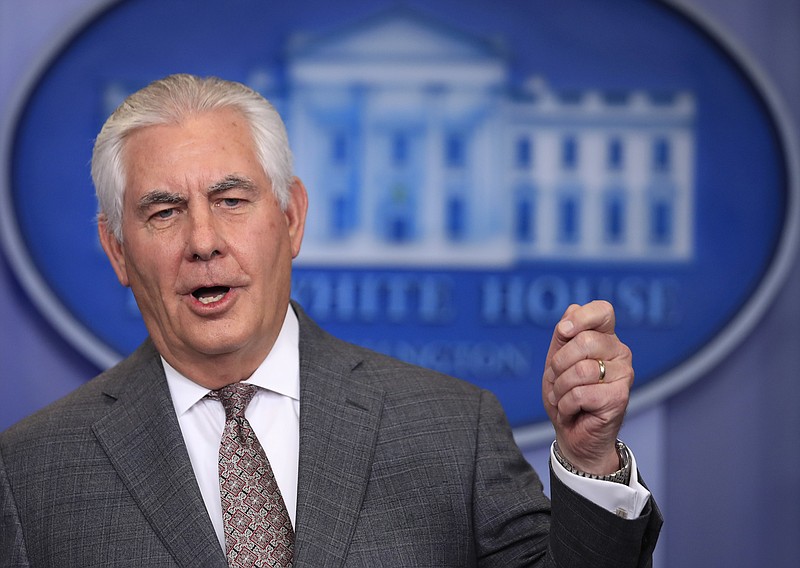WASHINGTON (AP) - President Donald Trump announced Monday the U.S. is putting North Korea's "murderous regime" on America's terrorism blacklist, despite questions about Pyongyang's support for international attacks beyond the assassination of its leader's half brother in February.
Trump said the designation as a state sponsor of terror was long overdue, and he promised a new wave of sanctions as part of a "maximum pressure campaign" over North Korea's development of nuclear weapons that could soon pose a direct threat to the U.S. mainland.
North Korea will join Iran, Sudan and Syria on the blacklist. The North had been designated for two decades until 2008 when it was removed in a bid to salvage international talks aimed at halting its nuclear efforts. The talks collapsed soon after and haven't been revived since.
Secretary of State Rex Tillerson said the designation was a "very symbolic move" with limited practical effects although it could close a "few loopholes" in a tough sanctions regime that was starting to bite in Pyongyang. He said anecdotal evidence and intelligence suggests the North is suffering fuel shortages, with queues at gas station, and its revenues are down.
Still, Tillerson also acknowledged a two-month pause in the North's rapid tempo of nuclear and missile tests and said there was still hope for diplomacy. With tougher sanctions in the offing, he warned North Korean leader Kim Jong Un, 'This is only going to get worse until you're ready to come and talk."
The designation is likely to exacerbate sour relations between Washington and Pyongyang that have turned uglier with name-calling between Trump and Kim. There was strong bipartisan support for the move in Congress, which had passed legislation in August requiring the State Department to make a determination on the issue.
"In addition to threatening the world by nuclear devastation, North Korea has repeatedly supported acts of international terrorism, including assassinations on foreign soil," Trump said as he announced the designation at a Cabinet meeting at the White House.
The action had been debated for months inside the administration, with some officials at the State Department arguing North Korea did not meet the legal standard to be relisted as a state sponsor of terrorism.
U.S. officials involved in the internal deliberations said there was no debate over whether the slaying of Kim's half brother Kim Jong Nam was a terrorist act. Malaysian authorities have said he was killed by two women who smeared suspected VX nerve agent onto his face on Feb. 13 at Kuala Lumpur airport.
Lawyers said there had to be more than one incident, and there was disagreement over whether the treatment of American student Otto Warmbier, who died of injuries suffered in North Korean custody, constituted terrorism.
Tillerson said Kim Jong Nam's assassination was a "significant event" for the determination, but when asked about other assassinations, he said, "I don't have anything I can share with you specifically."
In making the announcement, Trump did refer to Warmbier "and the countless others so brutally affected" by North Korean oppression.
He said more sanctions would be imposed on North Korea and "related persons" the Treasury Department would begin to announce Tuesday - part of rolling effort to deprive Pyongyang of funds for its nuclear and missile programs and leave it internationally isolated.
"It will be the highest level of sanctions by the time it's finished over a two-week period," Trump said.
North Korea is already subject to an array of tough U.S. and U.N. sanctions restricting trade, foreign assistance, defense sales and exports of sensitive technology.

